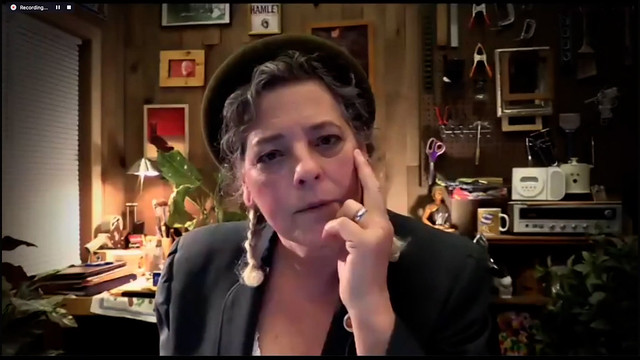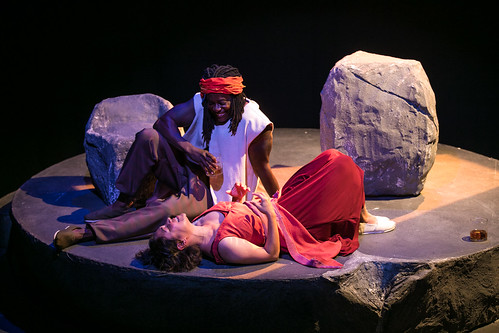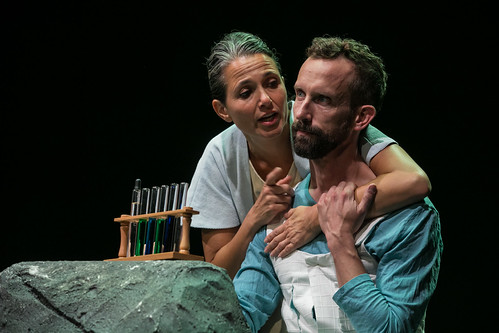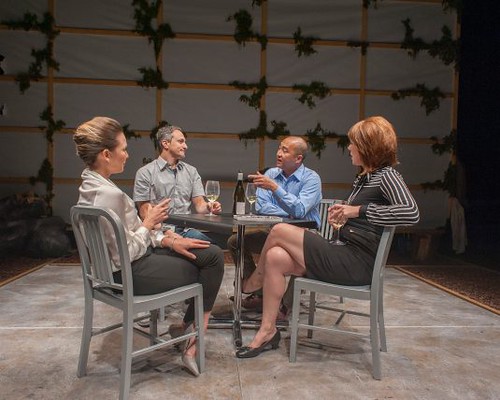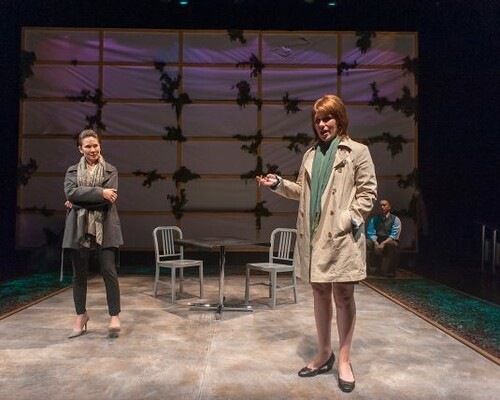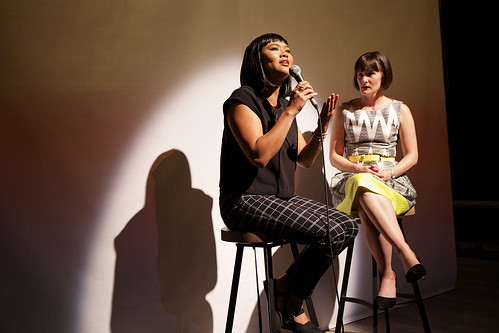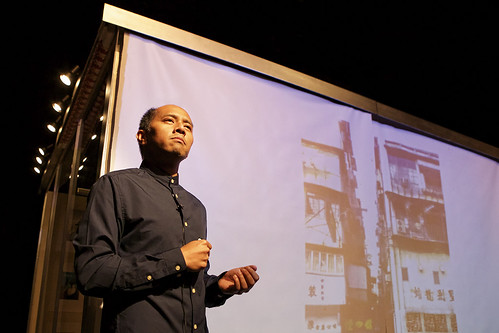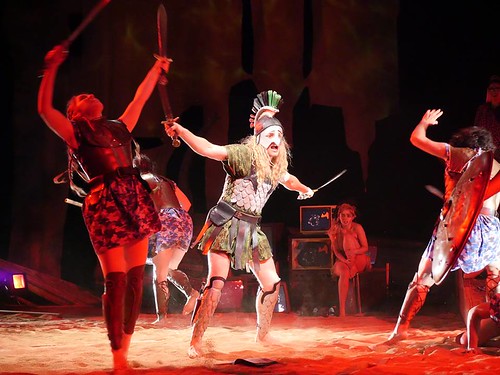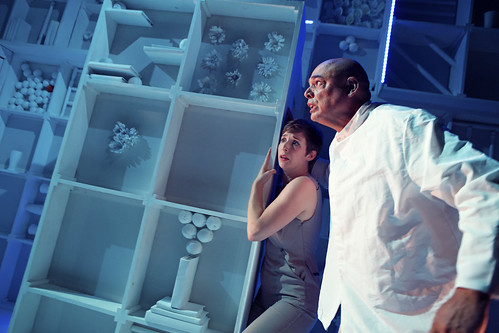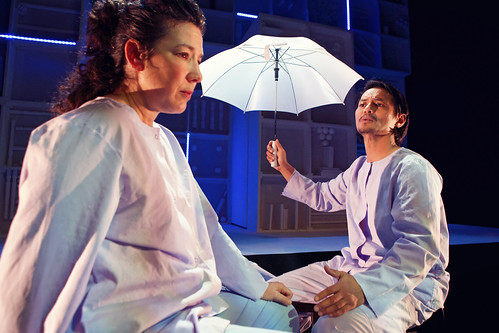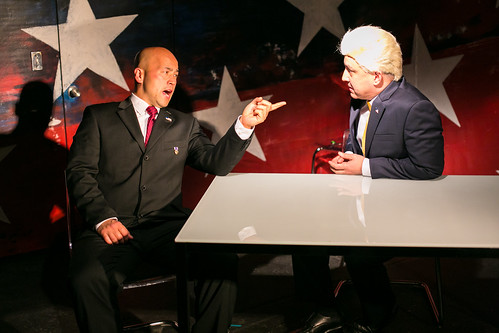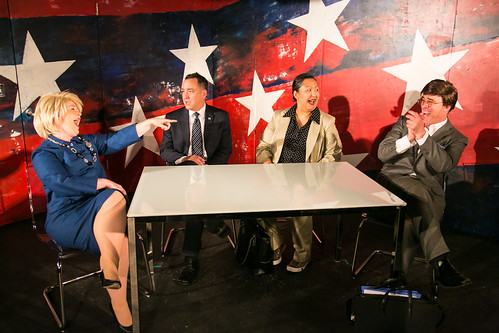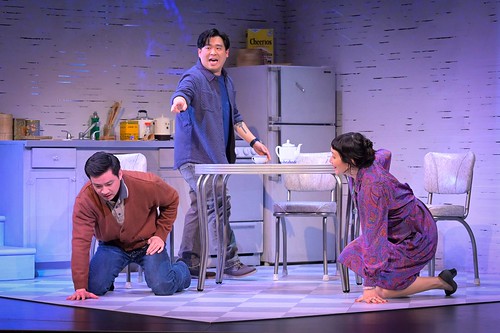
ABOVE: Johnny M. Wu as George (left), Phil Wong as Henry (center) and Erin Mei-Ling Stuart as Leena in the West Coast premiere of Christopher Chen’s The Headlands, running at ACT’s Toni Rembe Theater through March 5. BELOW: Charles Shaw Robinson (left) is Detective, Wong (center) is Henry and Sam Jackson is Jess. Photos by Kevin Berne
San Francisco playwright Christopher Chen seems to revel in puzzle, enigma and truth quests. His fascinating body of work is rich with mystery and unconventional theatricality. He’s one of the most interesting and intelligent playwrights working today, and he’s one of those artists who, when you see his name attached to something, you immediately check it out.
This is quite true of Chen’s The Headlands, now receiving its West Coast premiere (after being at Lincoln Center Theatre in early 2020 right before lockdown) at American Conservatory Theater’s Toni Rembe Theater. This one-act drama is a murder mystery and a complex family drama all rolled into one compelling package.
The less revealed about the plot the better, so I’ll just say that this is the story of Henry Wong, a San Francisco native and resident of the Sunset. As played by Phil Wong, Henry is distractingly charming. He speaks directly to the audience and lets us know that he’s an amateur sleuth with a penchant for solving cold cases. There’s one particular 20-year-old case that intrigues him. It involves a murder (or was it?) in his neighborhood. Not just in his neighborhood but in his house. OK. It was his dad. His dad was the victim, and Henry was only 10 years old.
Henry is what you call an unreliable narrator, but then again, how many 10-year-olds make reliable witnesses? His charm and easygoing manner pull us into his quest, but in true Chen fashion, the excitement of a whodunit soon gives way to some serious family complexities that make The Headlands more of an emotional puzzle than a criminal one.
That’s not to say we don’t care about what really happened to Henry’s dad and who may or may not have killed him. We absolutely do, and director Pam MacKinnon creates a propulsive but still deeply emotional production that plays with the idea of creating a film noir for the stage without sacrificing content to genre.
The set by Alexander V. Nichols really is another character here because it contains the whole world of Henry’s story – his past and present, his memories, his misconceptions. The basic structure comprises the plain gray walls of Henry’s family’s Sunset – two stories, a staircase, a kitchen, a window looking out onto the street. The set gracefully rotates, with walls that slide in and out, and all of it serves to hold Nichols’ vivid projections. They’re mostly of San Francisco and environs – Chinatown, the Sunset, Land’s End, the Marin Headlands, Coit Tower, SFPD’s Taraval Station, Lucca Deli (which practically got a round of applause) – but we also get moody images of fingers hitting piano keys, glass breaking, an IV drip. As Henry delves deeper into his family’s secrets, the projections are a kind of stream of consciousness that envelops everyone and wraps them in the beauty and moodiness of San Francisco.
I’m not usually a fan of abundant projections in live theater (why not just make a movie?), but MacKinnon and Nichols use them so artfully and effectively I was completely mesmerized. When the story reaches intriguing places, the projections fade so the focus can be on the characters. There’s only one scene, to my mind, when the projections overstep and briefly (but still ineffectively) take over the storytelling.
The actors never get overwhelmed by the production primarily because they’re all so good. Beginning with Wong’s increasingly complex Henry, the cast does service to the murder mystery tropes but has no problem digging in to the demands of the family drama. Sam Jackson as Jess, Henry’s girlfriend, helps us navigate what we can and cannot trust in Henry’s storytelling, and Keiko Shimosato Carreiro adds whole new chapters to stories Henry thought he knew.
The invaluable Charles Shaw Robinson turns up twice and manages to fascinate both times (and reveal how casual racism can have drastic results). But it’s the trio of Jomar Tagatac, Erin Mei-Ling Stuart and Johnny M. Wu that carries the biggest dramatic load. Their stories involve elements of mystery (of course), rom-com, immigrant saga, soap opera and Greek drama, and the actors make it all feel real and vital.
The Headlands is seductive in the way that murder mysteries can be, but its cold case fever gives way to greater depths as one man wrestles with his family – their ghosts, their mistakes and their love for him. It’s a captivating experience that feels deeply rooted in San Francisco, not just as a location but as a state of mind – a head land, you might say.
[Bonus Chen!]
Last year, Christopher Chen dropped an Audible Original called The Podcaster, a 92-minute audio play that messes with the whole notion of podcasts. Of course there’s a mystery involved, and it’s a blast. Get more info here.
FOR MORE INFORMATION
Christopher Chen’s The Headlands continues through March 5 at American Conservatory Theater’s Toni Rembe Theater, 415 Geary St., San Francisco. Running time: 100 minutes (no intermission). Tickets are $25-$110. Call 415-749-2228 or visit act-sf.org.


